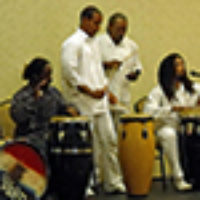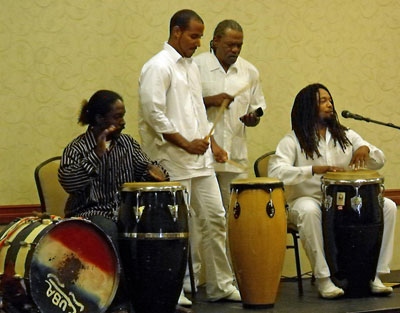
Juan Carlos Blanco Riera
Afro-Cuban percussion
 Afro-Cuban folklore consists of a rich body of music (song and percussion) and dances that are intrinsically linked and interdependent. This cultural art form preserves the heritage that was brought to Cuba from Africa. Historically, cultures were kept alive through cabildos, or cultural societies (sometimes secret), that united people from common tribes. Communities with the strongest cultural presence in Cuba are the Yoruba (from present-day Nigeria), Arará (from present-day Benin & Togo), Congo (from Bantu-speaking tribes in present-day Angola), and Franco-Haitian (Bantu-speaking tribes who came to Cuba via Haiti). Some of Afro-Cuba’s folklore is religious—like the dances, rhythms, and songs for the Yoruba orishas, or deities; or Palo, a religious warrior dance of the Congo people. Other parts of Afro-Cuban folklore represent secular aspects of life such as the dances, songs, and rhythms of the Makuta and Gagá from Bantu-speaking peoples.
Afro-Cuban folklore consists of a rich body of music (song and percussion) and dances that are intrinsically linked and interdependent. This cultural art form preserves the heritage that was brought to Cuba from Africa. Historically, cultures were kept alive through cabildos, or cultural societies (sometimes secret), that united people from common tribes. Communities with the strongest cultural presence in Cuba are the Yoruba (from present-day Nigeria), Arará (from present-day Benin & Togo), Congo (from Bantu-speaking tribes in present-day Angola), and Franco-Haitian (Bantu-speaking tribes who came to Cuba via Haiti). Some of Afro-Cuba’s folklore is religious—like the dances, rhythms, and songs for the Yoruba orishas, or deities; or Palo, a religious warrior dance of the Congo people. Other parts of Afro-Cuban folklore represent secular aspects of life such as the dances, songs, and rhythms of the Makuta and Gagá from Bantu-speaking peoples.
Master artist Juan Carlos Blanco Riera was born and raised in the Guanabacoa community of Havana, Cuba. He has been surrounded by Afro-Cuban art forms since birth, but started his formal education at the age of 7 when he joined Cumballe, a youth folkloric company in Guanabacoa. As a teenager, Juan Carlos joined Oba Ilu, a pre-professional folkloric company. He studied dance under master instructors Nicholas Moore and Jesus “El Congo.” He apprenticed folkloric percussion with two religious drummers highly respected in his community, Lucio “El Isue” and Manolito Caravela. At the age of 21, he was selected to join Havana’s Raices Profundas. After immigrating to the United States in 1997, Juan Carlos founded Omo Aché Afro-Cuban Music & Dance Company in San Diego.
Juan Carlos participated in ACTA’s Apprenticeship Program in 2010 with apprentice Menelike Turner. Juan Carlos worked with Menelike in developing more nuance and refinement in the techniques of Afro-Cuban batá drumming, and guided Menelike in learning songs and rhythms for each of the orishas, ultimately grooming him to become a lead percussionist for Omo Aché Afro-Cuban Music & Dance Company.

